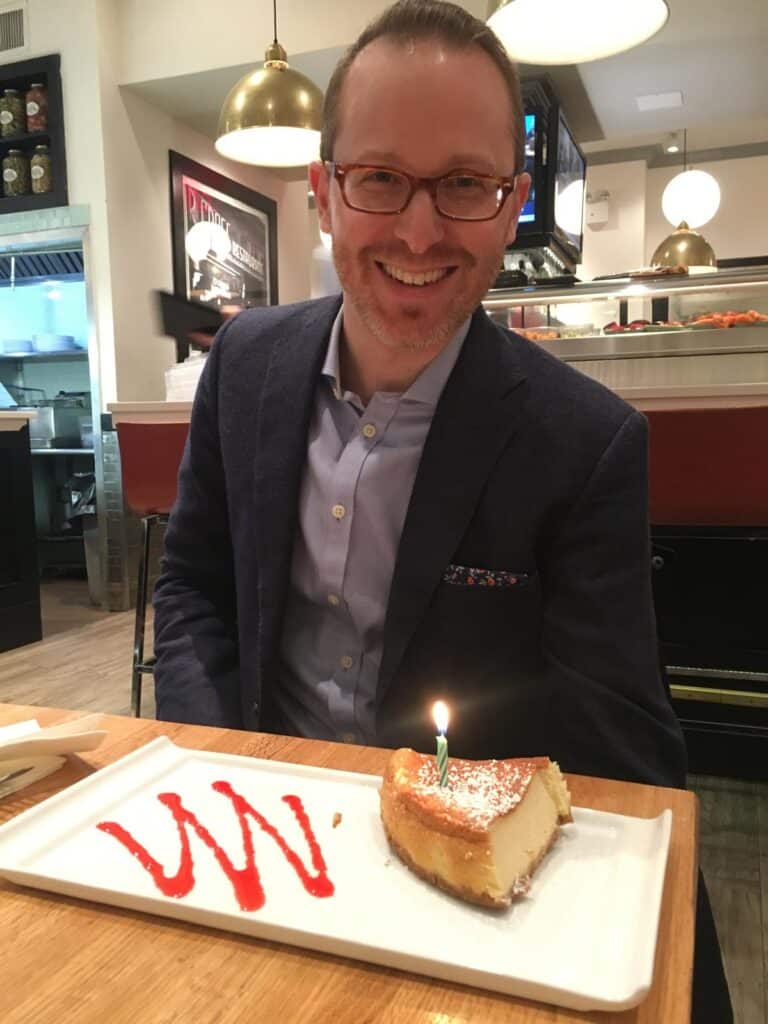
Today’s kosher social media landscape is large: Famous Jewish chefs like Jake Cohen have amassed audiences of millions, as have home chef influencers, and accounts dedicated to the business of kosher dining. This wasn’t the case back in 2008 when digital marketer Dani Klein founded his website and Instagram account, YeahThatsKosher.
Klein originally intended YeahThatsKosher to be a travel blog focused on kosher options around the world after he took a trip with his wife to Scandinavia. Over 15 years later, YeahThatsKosher has morphed into a hub for kosher restaurant news; global guides; recipes; and resources on finding everything from kosher wineries, sports arenas, and places to eat during Passover.
@yeahthatskosher Ever seen something like this before? #firetruck #foodtruck #longisland #kosher
♬ Fire – Ohio Players
Boasting 65,000 followers on Instagram and over 100,000 monthly visitors on the website, Klein’s business is now an entire kosher ecosystem that includes a partnership with the app Kosher Near Me, which helps folks find restaurants across the globe.
“When you leave the comforts of New York, Miami, Jerusalem or Los Angeles, where keeping kosher or being an observant Jew is easy, it becomes a challenge,” Klein told Unpacked.
After 16 years, YeahThatsKosher continues to pioneer kosher food content
Today, many have followed Klein’s lead, creating their own online resources focused on kashrut. But YeahThatsKosher continues to be a formidable player in the game, often the first to report on openings and closings around the globe.

“I think about the metaphor about the rising tide lifting all boats. The more people you have talking about kosher food, the better it is for businesses and the community, so I am happy that there is room for others to be doing this. At the same time, I don’t think there are others doing it the way I do it,” Klein said.
With his status as a kosher food influencer, Klein now finds himself in the interesting position of being considered a critic, despite feeling reluctant to embrace that title. His followers don’t just look through his Instagram account to find a list of nearby restaurants, after all. They often seek out Klein’s take on the food and ambiance as well.
Klein lacks professional experience as a critic and still works full time as a digital marketer, which is also why he finds it difficult to navigate his followers’ desire for restaurant reviews.
@yeahthatskosher Is Malka NYC worth the hype? We definitely had many great dishes and a few head scratchers. I’d love to give it some time and try it again to be honest. What has your experience been at @malka_nyc so far? #kosher #nyc #eyalshani #israelirestaurant #uws
♬ original sound – Dani Klein • YeahThatsKosher
It’s not just about experience: Klein understands that he has a responsibility to use his large social following for good.
“I can have an outsize influence in hurting a business, and that’s never my intention,” he said candidly, explaining that when he dines at a subpar eatery, Klein usually opts to “say less” in his post instead of negatively criticizing the eatery online.
That being said, he is not blind to the flaws of the kosher dining system.
“Are there businesses that serve kosher food that aren’t doing a good job? Absolutely,” Klein remarked. “Should they be called out in some way? Yes, but the conversations should be done privately and, if they are not listening to you, then they should be aired out. I think that when you charge consumers for a product, people deserve a decent one.”
The role of the kosher food influencer
Klein explained that he does and also doesn’t consider himself to be a critic because he eats at kosher restaurants as a foodie and not in a professional context. However, if people take his content to be reviews, he doesn’t mind if it encourages them to check out a new kosher joint.
“I will go out to restaurants as a part of my life but not as a part of my job. I need to eat three meals a day and, as I’m going about my life, I’m going to catalog my experiences. I very much want kosher, Jewish businesses to succeed so, for me, it’s a win/win,” he said.
@yeahthatskosher New KOSHER Italian Bistro in Israel. Definitely worth a try when you’re in or near רחובות – BARDELAS #KOSHER #Israel
♬ original sound – Dani Klein • YeahThatsKosher
However one thing is for sure: Constantly writing and reporting on restaurants has changed the way Klein eats out. His whole life has shifted in order to accommodate content creation.
“I’m a forever content creator because social media is something you have to constantly feed,” he said. “I’m changing how I travel and where I travel to because I also want foodie experiences as part of my journeys.”
The creation of the high-end kosher restaurant
The Internet guru has been a first-row spectator to how social media has changed the kosher food industry. Social media has been an opportunity for kosher restaurants to capitalize on short form content by upping their quality and plating. Many new restaurants that have recently opened have kept “Instagrammable” ambiance in mind. This is a far cry from what kosher dining looked when Klein began his account.
As he sees it, in the last decade or so, diners witnessed “an explosion of high-end kosher establishments” likely a result of the very visuals that have come to define social media.
“If you think about the kosher restaurant scene pre-Instagram, for the most part, there weren’t that many upscale options,”Klein said. “Most were fast food, mid-tier, nothing particularly fancy.”
@yeahthatskosher Pitmaster is the meaty vibe yoire seeking in Jerusalem. What a crazy awesome experience you meed to try at least once! Perfeft for all carnivores, especially kosher ones. #israel #kosher @Pitmaster 🔥
♬ original sound – Dani Klein • YeahThatsKosher
But there’s more: Klein believes that going to a restaurant has now become an experience, which has, in turn, become the currency of the moment.
“You have Millennials and also some Gen Zers who care more about experiencing things than owning physical products,” he notes. “It correlates with the timing of Millennials becoming adults and earning real income that they can then spend on experiences.”
How future generations will implement changes on the system moving forward is yet to be seen, but one thing is for sure: Klein and his social media empire YeahThatsKosher will continue to document it all.
